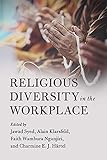Religious diversity in the workplace /
Title By: Syed, Jawad [Edited by] | Klarsfeld, Alain [Edited by] | Ngunjiri, Faith Wambura [Edited by]
Publisher: New York, NY : Cambridge University Press, c2018.Description: xxii, 495 p. ; 23 cm.ISBN: 9781316501733Subject(s): Religion in the workplace | Cultural pluralism -- Religious aspectsDDC classification: 204.4 SY RE Online resources: Location Map| Item type | Home library | Call number | Status | Notes | Date due | Barcode | Item holds |
|---|---|---|---|---|---|---|---|
| REGULAR | University of Wollongong in Dubai Main Collection | 204.4 SY RE (Browse shelf) | Available | April 2018 | T0059263 |
, Shelving location: Main Collection Close shelf browser

|

|

|

|

|

|

|
||
| 201.5 SW PR The problem with interreligious dialogue : | 201.73 TH RE Religion and organizational stigma at work | 201.73 TH RE Religion and organizational stigma at work | 204.4 SY RE Religious diversity in the workplace / | 204.4 TO NE A new earth : | 204.4 TO NE A new earth : | 204.4 TO ON Oneness with all life |
Introduction: the complex interface of work and religion Jawad Syed, Alain Klarsfeld, Faith Wambur Ngunjiri and Charmine E. J. Hartel; Part I. General Frameworks and Sources of Reflection: 1. A relational perspective on religious diversity at work Jawad Syed; 2. Religious diversity, identity and workplace inclusion Charmine E. J. Hartel, Jasmin C. R. Hartel and Prem Ramburuth; Part II. Religious Approaches: 3. The Christian faith and the preservation of personal identity Timothy Ewest; 4. Islamic view of diversity: implications for the business world Abbas J. Ali; 5. The untold, the unseen and the forgettable: Jewishness, Jews and Judaism in diversity management scholarship Alain Klarsfeld; 6. National perspectives on Jews at work: contrasting Australia, France, Israel and the UK Alain Klarsfeld, Diane Bebbington, Avi Kay, Lucy Taksa, Fei Guo and Philip Mendes; 7. Hinduism, religious diversity and spirituality at work in India Radha R. Sharma and Rana Haq; 8. Buddhist Brahmaviharas and religious diversity at work Edwina Pio; Part III. Regional Approaches: 9. Spirituality and workplace diversity practices in Africa Kurt A. April, Thabo Makgoba and Dion A. Forster; 10. The French principle of Laicite and religious pluralism in the workplace: main findings and issues Patrick Banon and Jean-Francois Chanlat; 11. Lessons from the academy: Concordia College's journey toward religious pluralism Jacqueline Bussie and Michelle Lelwica; 12. Religious diversity in the Canadian workplace: the case of Muslims Hanifa Itani and Yusuf M. Sidani; 13. Religious diversity at work in the Asia-Pacific region Edwina Pio and Timothy Pratt; Part IV. Organizational Approaches: 14. Organizational approaches to religious diversity in the workplace Timothy Ewest; 15. From diverse references to diverse attitudes towards religion at work: focus on the French case Geraldine Galindo and Hedia Zannad; 16. Resilient leadership and tempered radicalism: navigating the intersections of race, gender, nationality and religion Faith Wambur Ngunjiri and Kathy-Ann C. Hernandez; Index.
Employees bring their beliefs and religious values to work, and this can be a source of either positive performance or negative conflict. Social conflicts around religion impact more than societies and communities. They also impact organizations. 'Anti-religion' sentiments tend to be based on the perception that religion can be neatly separated from the 'more acceptable/palatable' spirituality, but this ignores the fact that - for most people - the two are intimately intertwined and inseparable. As religious identity is salient for a majority of the world's population, it is thus an important aspect of organizations - particularly those with a large and diverse body of employees. This handbook provides a timely and necessary analysis of religious diversity in organizations, investigating the role of national context, the intersections of religion with ethnicity and gender, and approaches to diversity management.
